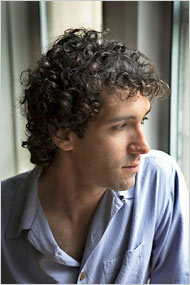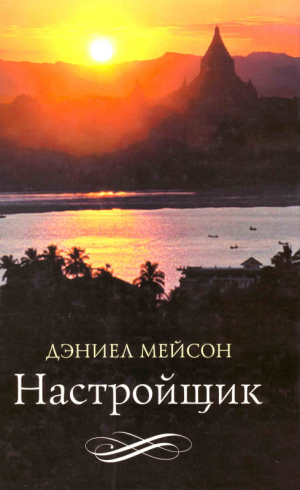Об авторе
Daniel Mason
Первый роман Дэниела Мейсона, «Настройщик», опубликованный в 2002 году, когда автор еще был 26-летним студентом-медиком, был великолепным дебютом. Частично bildungsroman (термин, означающий роман, в котором в фокусе оказывается физическое и моральное развитие главного героя от детства до вступления в взрослую жизнь), частично «квест» в стиле Джозефа Конрада, частично сага, напоминающая «Одиссею», роман представляет собой донкихотскую историю британского настройщика фортепиано по имени Эдгар Дрейк, которого в 1886 году Правительство Ее Величества отправило в далекое селение в Бирме, чтобы привести в порядок фортепиано, принадлежащее доктору Энтони Кэрроллу, эксцентричному офицеру, командующему жизненно важным фортом. Тщательно выписанные Мейсоном, сюжеты о Дрейке и Кэрролле стали одновременно и повествованием о жестокости и компромиссах в стиле приключенческого романа времен Британской империи, и кратким размышлением над самим процессом повествования.
Второй роман Мейсона, «Далекая страна», характеризуется тем же безупречным щегольским стилем повествования, продемонстрированным в его первой книге, но это не столь четкое, более «размытое», если так можно выразиться, произведение, которому недостает интуитивной силы и энергии его предшественника. В то время как «Настройщик» искрится четко подмеченными деталями и поэтическим чувством места, которое порождено исследованием исторических источников и собственными путешествиями автора по Азии, действие «Далекой страны» происходит в неназванной стране «третьего мира» - в месте, которое представляется более метафорой для неразвитого мира, нежели реально существующим местом.
Действительно, весь роман больше напоминает басню: персонажи – это жирными штрихами очерченные силуэты, почти без психологической глубины в них, и сюжет скорее похож на сказку, перенесенную в современные декорации. Временами, роман читается как менее тенденциозная импровизация на тему футуристического романа Дорис Лессинг «Мара и Данн»,в котором описываются странствования брата и сестры через пустынную обезвоженную землю, иногда, он читается как менее смешная вариация на тему мелодраматического романа Джона Апдайка «Бразилия», перенесшего легенду о Тристане и Изольде в мифическую Латинскую Америку. Роман «Далекая страна» повествует о жизни молодой девушки по имени Изабель, выросшей в бедной семье рубщиков тростника в пораженной засухой бедной местности, в маленькой деревушке с говорящим названием Кейн («тростник»).
Indeed, the whole novel has a fablelike quality to it: the characters are boldly drawn stick figures with little psychological depth, and the plot too feels like a folk tale transported to the modern era. At times, the novel reads like a less tendentious improvisation on Doris Lessing’s futuristic novel “Mara and Dann,” which traced the peregrinations of a brother and a sister across a desolate, drought-stricken land; at other times, it reads like a less ridiculous variation on John Updike’s melodramatic novel “Brazil,” which transported the Tristan and Iseult legend to a mythical Latin America.
The heroine of “A Far Country” is a young girl named Isabel, who grows up in St. Michael in the Cane, a tiny village located in a remote valley in a drought-ravaged land. Her parents and neighbors all work as cane cutters and lead a simple, impoverished existence that seems light years removed from the 21st century.
There is no running water in the village, and only one phone and one icebox, which is usually empty. When droughts come — and they’ve been coming more and more frequently and seem to last longer and longer — food grows so scarce that the people of St. Michael are forced to search for tubers and cactus fruit in the hills. They roast ants for dinner and dream about food.
“The world separated,” Mr. Mason writes, “into categories of things that could and could not be eaten.”
At an early age, Isabel demonstrates uncanny powers. She can tell what will happen to people before they know it. She can calm unruly babies. She has strange, dreamlike visions. And she can find her older brother Isaias in the vast cane fields with unerring radar.
Her mother tells her that there are “certain people for whom there was less of a barrier between this world and the other one,” and that these people “could become healers or poets or could hear the word of God. They could see and smell and feel what others couldn’t. But they were vulnerable to everything: they were haunted by spirits that others couldn’t see, felt others’ sufferings, fell ill more easily and often.”
The center of Isabel’s life is Isaias, who teaches her the names of plants, takes her on early morning walks to see the birds before they hide from the sun, who “found fossil fish for her in the eroded sandstone and showed her rock etchings of men and animals.” He is her teacher, her protector, her idol, her other self. And her faith in his gifts helps give him the courage to pursue his dreams.
An aspiring musician, Isaias feels restless and suffocated in St. Michael, and one day he leaves for the big city in the south. When he returns, he talks about joining a band that performs for tourists at a seaside hotel and quotes a man who predicts he will go far with his musical talent. He tells Isabel “about nights in plazas lit by long strings of bare bulbs, dances that went on until dawn,” and tips that fell “so fast that they rang in the plastic bowl like a shaking tambourine.” Then he leaves for the city again and does not return.
At 14, Isabel follows Isaias to the city, making the frightening journey there by herself — a small girl nearly crushed by the other jostling migrants aboard a flatbed truck. Her job is to baby-sit her cousin Manuela’s infant son while Manuela is at work (her job as a maid is a two-and-a-half-hour bus ride away) and she moves into Manuela’s tiny shack in one of the city’s sprawling slums. For months, Isabel waits in vain for Isaias to turn up at Manuela’s door, then begins wandering the city in search of him, hoping to find him the way she used to find him in the cane fields at home.
Mr. Mason does a lyrical job of conjuring the confusion, glitter and menace of the city, as seen through a naïve country girl’s eyes, and he proves equally deft at contrasting the metropolitan chaos with the spartan world Isabel knew in St. Michael. He conjures the aching poverty faced by Isabel’s family in the drought-plagued countryside, and the anonymity and powerlessness faced by migrants like Isabel in the big city.
But while he makes the reader sympathize with Isabel’s plight, it is an abstract sort of sympathy — the sort of sympathy people feel for the poor or the homeless, glimpsed on the evening news. Isabel herself remains more of a symbol than a person, and in the end her quest for her missing brother, too, feels less like a real search than a sort of Jungian hunt for a missing part of herself.



![Вена, начало XX века. Люциуш Кшелевский – юноша из аристократической польской семьи. В отличие от братьев, выбравших традиционные для шляхты занятия, он решает... Зимний солдат [litres][The Winter Soldier]](https://www.rulit.me/data/programs/images/zimnij-soldat-litres-the-winter-soldier_791020.jpg)
![Эдгар Дрейк всегда считал, что он не создан для приключений. Один из лучших лондонских настройщиков фортепиано, он ведет размеренную и спокойную жизнь, в которой... Настройщик [litres][The Piano Tuner][Другая редакция перевода]](https://www.rulit.me/data/programs/images/nastrojshchik-litres-the-piano-tuner-drugaya-redakciya-perev_799465.jpg)
![Роман Дэниела Мейсона, действие которого охватывает четыре столетия, – это повествование об одном доме, затерянном в лесах Западного Массачусетса, и о череде его... Северный лес [litres][North Woods]](https://www.rulit.me/data/programs/images/severnyj-les-litres-north-woods_860010.jpg)
Комментарии и оценки к книгам автора